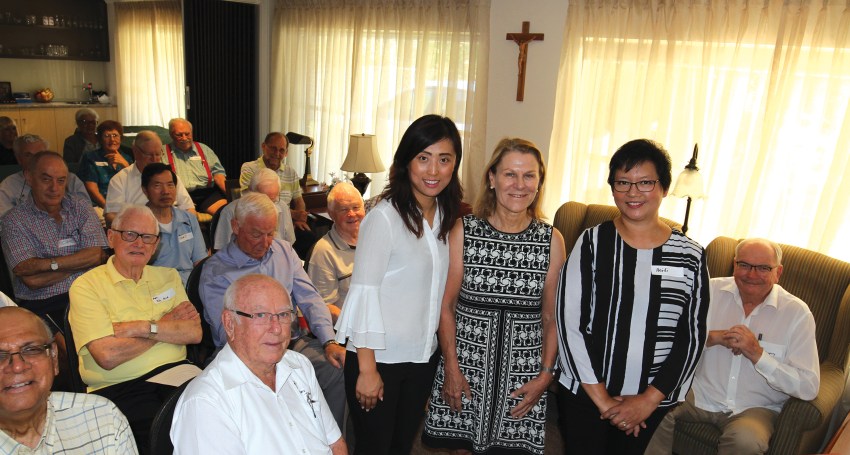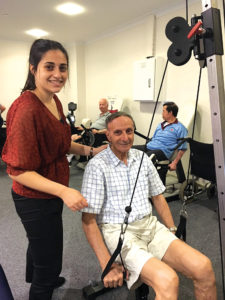Caring for our clergy
People
In the first in a series looking at some of the different programs within the Adelaide Archdiocese, LINDY McNAMARA discovers that working for the Clergy Care team is definitely not a job for someone wanting a 9 to 5 routine.

It’s a Monday morning and a small group of priests arrive at the gym at St Hilarion’s Aged Care facility at Seaton. They’re running a bit late because Clergy Care coordinator, registered nurse Brie Yang, who is their driver, had an unscheduled visit to the Royal Adelaide Hospital earlier that morning to check on one of the Archdiocese’s priests who is seriously ill. (Sadly, the next day Fr Denis Edwards passed away).
Professional as always, Brie continues her responsibilities to the gym ‘junkies’ who work out on the machines for the next hour under the watchful eye of physiotherapist Olivia
.

Fr George Nader working out under the watchful eye of physio Olivia.
Fr George Nader, who was a footballer of note in his day, is leading the way. Physically active throughout his life, at 84 he (with the support of Brie) has been a driving force in encouraging some of his colleagues to embrace more strenuous exercise.
“We definitely feel the benefit of it…it helps our balance and strengthening of our limbs and muscles,” said Fr George as he lifted some weights.
Advertisement
“Brie and (Clergy Care coordinator) Heidi are very important – they do a great job for us,” he adds.
The weekly gym sessions – which are also enjoyed by the Villa Murphy priests Fathers Eddie Welling, Adrian Noonan and Tong Tran – are just one of the activities organised by Clergy Care as part of its mission to look after the physical and emotional wellbeing of the 120 priests, deacons, seminarians and housekeepers in the Adelaide Archdiocese.
For Brie and Heidi Oria every working day is different and there is no 9 to 5 routine.
“We never have two days the same and we have to be very flexible with our time and be ready to travel long distances to visit regional priests,” Heidi said.
Some of their role includes organising and attending medical appointments with those priests who require assistance and as a registered nurse, Brie is also able to conduct health assessments, care planning and referrals to health services when required. Checking vital signs such as blood pressure, temperature, pulse, sometimes medication administration and wound care are also provided when needed.
Advertisement
Getting phone calls out of hours from priests concerned about their health goes with the territory and on the weekends you will often see Brie and Heidi attending social functions for the clergy.
The team regularly collects information from the priests about their areas of interest and organise social events accordingly.
During the Fringe they attended a concert at the Norwood Town Hall and this month there is a tour of the Adelaide Oval.
When the Archdiocese’s oldest priest Mgr Vincent Tiggeman turned 90 in March, the Clergy Care Team was happy to help organise the celebrations.
International priests arriving to start their ministry in the Archdiocese are greeted at the airport with a welcome basket containing items such as toiletries, sunscreen, moisturiser, stamps, stationery, a Metro card, bus and tram timetables and a map of the city. They also receive visits and ongoing transitional support from the team, to get an overview of the local medical system and put them in contact with any medical services they may require.
Heidi, who has a background in aged care, is also on hand to help the priests with shopping requests and tours around the CBD.
With more than a quarter of the priests in their care now in retirement, Brie said raising awareness of self-care was fundamental for positive ageing. Information sessions and presentations have been organised to equip the priests with the practical knowledge they need to make informed decisions.
Recently leading geriatrician Dr Jane Hecker spoke to a group of retired priests about ways of protecting the brain from ageing and diseases such as Alzheimer’s.
“It’s about positive thinking because ageing can be tricky, but it’s about the glass being half full, not half empty.
“You’re fortunate you’ve got a real community in the sense of being together and a connection with each other which is very important,” Dr Hecker told the group.
While Brie and Heidi agree that the priests are well looked after by the Church community, they believed they were considered part of their “extended family”.
“The priests all care for one another,” Brie said.
“However, when their physical health is limited it can be confronting for them… that is aged care in general.
“I guess you could say we work side-by-side with clergy and their family, walking alongside them in their journey through the ageing process.”
Having worked in Clergy Care for the past six years, Brie said she really enjoyed the role promoting and practising a holistic model of care. The team is focused on “person-centred” care tailored accordingly to each priest’s needs while valuing the importance of their spirituality as clergy.
“Our approach to care for clergy is respectful, supportive, observant, listening, patient, asking rather than telling, and making regular contacts. We plant the seed, going gently on a case-by-case basis until the desired outcome is reached,” Brie said.
Heidi added that they worked closely with the clergy and their family, health professionals, and the Delegate for Clergy Welfare, Fr Antoni Adimai, Administrator Delegate, Fr Philip Marshall and Apostolic Administrator, Bishop Greg O’Kelly SJ “every step of the way”.
“We respect their individualism. They trust us and we don’t judge… we just care.”








Comments
Show comments Hide comments